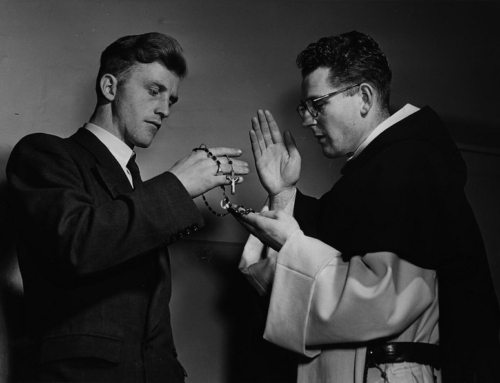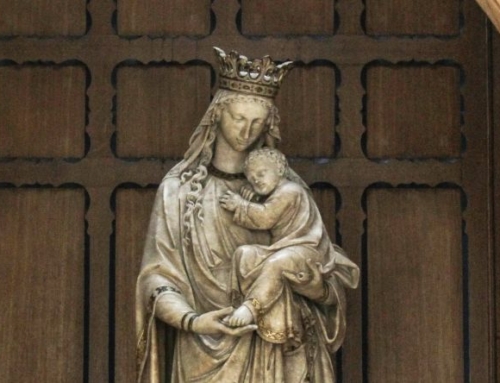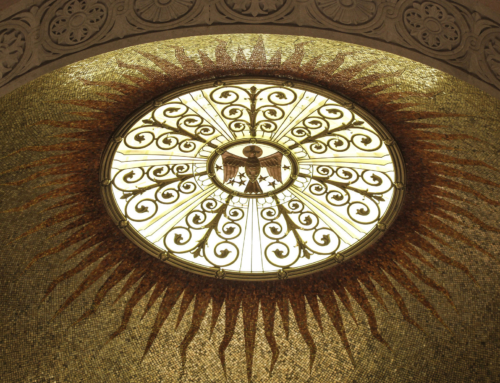Sohrab Ahmari. From Fire, by Water: My Journey to the Catholic Faith. San Francisco: Ignatius Press, 2019. 225 pp.
I have noticed with some amusement that, since its publication, many have compared Sohrab Ahmari’s From Fire, by Water: My Journey to the Catholic Faith to the Confessions of Saint Augustine. Comparison is not a science; it does not consist in a method or even an academic technique. Comparison consists principally in an act of discursive reasoning, when a man ponders the similarities or differences between alternatives. I believe that the pairing of Ahmari with Augustine is amusing because the observation is almost entirely predicated upon what they have in common and nothing more.
Ahmari, an opinion editor of the New York Post and a contributing author of the Catholic Herald, was first introduced to Augustine by way of his autobiography. This could hardly be a more fitting introduction, given the historical divide, between the two men. Their lives are a contrast in almost every way, but the pairing has been maintained, time and again, by no small number of people. This is because the biographical sketch of Augustine’s life, as recounted in his spiritual memoir, the whole story of his prodigal adolescence and eventual conversion, is also found in the life of Ahmari.
I would argue, however, that Ahmari’s spiritual memoir, From Fire, by Water, is only analogously related to Augustine’s Confessions. Any direct relation would disparage the brilliance of the latter work and unduly elevate the former to that of a classic. The common thread between the two books is conversion, which, regardless of historical moment, has a way of enthralling us, of transporting our faculties to an experience of the divine. Whether it be written by the doctor gratiae or an auctor simplex, conversion is emblematic of many a man and, as such, demands comparison. What is often forgotten in this comparison, however, is that which is different; it is this that protects us from making hasty remarks and generalizations about either work.
The real point of departure, where the similarities end and the differences begin, is found in the relentlessly modern flavor of From Fire, by Water. Look no further than the impetus for its writing: a tweet.
As Ahmari describes in the preface, the announcement of his conversion to Catholicism was as abrupt as it was acute, arriving on the screens of many tweeple (an actual term endorsed by Twitter), including professional influencers and prominent beat writers, who may have otherwise taken no notice and left the story unheeded. To be sure, the conversion of an Iranian-American is exceptional, but certainly not unprecedented. What was peculiar, however, was the socio-political climate in which those unassuming characters became, for lack of a better term, a beetweet (a buzzing tweet; a “hot” tweet):
#IAmJacquesHamel: In fact, this is the right moment to announce I’m converting to Roman Catholicism.
That so-called “right moment” was July 2016, when Father Jacques Hamel, a French priest, was martyred by adherents of the Islamic State. Given the grim circumstances of his passing, which drew international media attention, Ahmari’s tweet became the locus for Catholic self-aggrandizement on the social media platform. Suffice it to say, the fact that Ahmari was Middle Eastern (self-described as Iranian-born, but thoroughly American-made) incited the Twittersphere into something of a twittermob.
The tweet went viral. Thousands of social media users retweeted and liked the announcement within hours of the post. The brouhaha (as Ahmari describes it) merited a swift response. Not via Twitter—he had come to view the tweet as a mistake (a mistweet)—but by composing a book, the latest addition to the short list of spiritual memoirs, of which the Confessions is its unmistakable triumph.
From Fire, by Water is, then, as much a story about conversion as it is, curiously enough, an amended tweet. It is the clarifying remark that every Twitter feed allows, even if the Twitter feed has an abbreviated allowance. When the Twittersphere first read of Ahmari’s conversion to Catholicism, the arbitrary restraint on Twitter characters (140, at the time) barred his creative flair from elucidating upon God and grace and any number of related things. It is here, in his book, that Ahmari debunks the simplistic narrative that twitterers immediately supposed: “It wasn’t as if I had been praying to Allah one day and the next day accepted Christ as my savior” (From Fire, by Water, 15). His story is far more complicated and convoluted.
Ahmari goes to great lengths to explain that his conversion only came after a prolonged struggle of both intellectual and religious crises, during which he passed through several phases. This largely entailed his allegiance to various currents of eschewed philosophy and secular thought, including, but not limited to, the tomes of Friedrich Nietzsche, the tunes of Pink Floyd, and the tenets of Marxism.
Put simply, what Manichaeism was for Augustine, Marxism was for Ahmari. His initial attraction to Marxism consisted, strangely enough, in what often attracts people to religion. It offered him a reason to live (productivity and economic development), a robust understanding of the human person (driven by class struggle), and a means of salvation (in the creation of a utopian society). Over time, however, Ahmari’s Marxist confession gave way to atheism, atheism to agnosticism, and agnosticism to the possibility of Catholicism.
Because From Fire, by Water considers the personal experiences of Ahmari within these philosophical currents, the book is filled with its fair share of academic jargon. All the same, its author never runs the risk of leaving his readership behind. It is an honest autobiographical sketch, written by a man of considerable brilliance, for an audience of considerable diversity. As is to be expected, he has a compelling voice that always maintains a conversational feel. The short read is accessible to all, whether they be Catholic or not, whether they be familiar with Augustine or not.
The similarities between Ahmari and Augustine are quite clumsy since the men are not of the same generation. I understand, however, why this mode of comparison is popular, given the fact that both of them converted to Catholicism and then decided, for our benefit, to tell the tale. But it bears repeating that Ahmari is not Augustine; and Augustine is not Ahmari. Augustine wrote a timeless work. Ahmari wrote something that may be timeless, should we pick it up and read.
Reviewed by Br. Maximilian Jaskowak, O.P.
✠
Download a PDF of this article here



